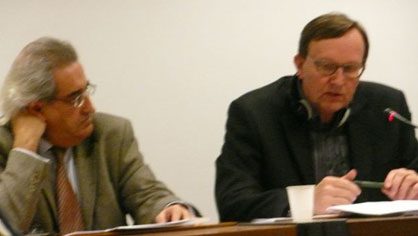27 January 2009
The debate on the CFP after 2012 started in earnest this week with an exchange of views between fishing industry representatives from the UK, Denmark, Germany, Netherlands, France, Spain, Italy and Malta and senior Commission officials.
The meeting was hosted by Europeche, the European fishing industry trade federation, as part of the preparations for a Commission Green Paper on the CFP that will be published in the spring.
The Commission insisted that it wanted a full and open dialogue on what type of CFP the industry wanted after 2012 but was challenged by the NFFO, who pointed to the extensive dialogue on the vexed issue of the unachievable 8% margin of tolerance between logbook estimates and the final (accurate) landing declaration. That dialogue which spelt out in detail the practical obstacles to observing an 8% margin of tolerance, especially for small quantities of by-catch species, had taken place over two conferences, numerous RAC meetings, an extensive correspondence and had resulted in a Commission proposal to reduce the MOT from 8% to 5%. Whilst doubtless that figure was included because the Commission is already in negotiating mode on the revised Control Regulation, it did not send a very positive signal on the type of dialogue the Commission was anticipating on the reform of the CFP*.
On the other hand it is worth recalling that the Commission is not a monolithic entity and policy is often the result of power struggles between different groups of officials and within the College of Commissioners. The highly critical but narrowly focused report on the CFP by the European Court of Auditors has spooked the Commission which accounts in large part for the Commission’s almost infantile initial paper on CFP reform.
The NFFO considers that despite these obstacles it is worth putting effort into improving the CFP, simply because there is no sign on the horizon of a realistic alternative and because the 2002 reform suggested that progress can be made and change is possible, even if the pace is glacial.
The Federation has prepared a document that outlines the main areas of reform it would like to see, which will be discussed by the NFFO Executive Committee at its next meeting. The guiding theme is that the CFP cannot be successfully managed on a command and control basis because of its scale and the variety and complexity of the fisheries under it. The alternative is to find ways of delegating management responsibility to the fishing industry, subject to an overall framework and adequate audit arrangements.
*Under questioning, the Commission conceded that 5% was an untenable value for a blanket margin of tolerance and that the issue would have to be resolved as the new Control Regulation passes through the negotiating process on a fishery by fishery basis. It is however far from clear exactly what purpose is served by having legally enforceable catch estimates at all. Where the authorities are confident that landings data are accurate, which is now in many fisheries, the MOT is simply a burden without reason.

